.
Ahmed was bussed from #Serbia to #Croatia -- now worried he'll be stuck here @AJEnglish #refugeecrisis: image via Mohamed Jamjoom @MIJamjoom, 17 September 2015
Joseph Ceravolo: Der Wanderer
..............................
Something overtakes me on the train.
..............................
Something overtakes me on the train.
Excavate the universe to brotherhood
of human kind. Sing out!
These last pale morns of paradise
break the blood apart.
.........What good is it
......where a harmonic chord
calls to a desolate child, hermetic,
and the clatter around me
is chewing up the earth.
.......Something overtakes the trip
...and lone mountains with three sailing birds
recall days of wandering and nights awake.
Joseph Ceravolo (1934-1988): Der Wanderer, 23 December 1986, from Collected Poems (2013)
Joseph Ceravolo (1934-1988): Der Wanderer, 23 December 1986, from Collected Poems (2013)
striking @AP photo of refugees crossing into Croatia, where landmines now pose a big threat: image via Rossalyn Warren @RossalynWarrren, 16 September 2015
Hundreds more arriving now at Tovarnik, Croatia. Very little shade No food/water.: image via Eric Randolph @EricWRandolph 17 September 2015
#CROATIA - Migrants board a bus at the train station in Dugo Selo, near Zagreb. By @Iandrej #AFP: image via Frédérique Geffard @fgeffardAFP, 17 September 2015
Croatian police say 5650 migrants entered Croatia via #Serbia in past 24 hrs. Majority through cornfields in #Sid.: image via Gavin Lee @GavinLeeBBC, 17 September 2015
A woman carrying her infant child in #Tovarnik #Croatia: image via marc hofer @marc hofer, 17 September 2015
Croatia flooded with migrants after Hungary clashes: image via Agence France-Presse @AFP, 17 September 2015
#Refugees #Migrants Some of several 1000 at station here in Tavornik. Hoping for train.: image via Fergal Keane @fergalkeane47, 17 September 2015
A man picks up his baby & bag as he hears train coming among thousands at Tovarnik station, Croatia. But false alarm.: image via Eric Randolph @EricWRandolph 17 September 2015
Last year 2500 'irregular migrants' entered Croatia, acc IOM. In the past 24 hours, 6300 #migrants have arrived here.: image via Gavin Lee @GavinLeeBBC, 17 September 2015
5,000 people at tiny Tovarnik station in Croatia, gov must act fast to stop this turning into same chaos as Hungary: image via Eric Randolph @EricWRandolph 17 September 2015
It's getting tense at Tovarnik as 5,000 people wait for a train. No chance they'll all get on. Temp due to hit 37: image via Eric Randolph @EricWRandolph 17 September 2015
Chaos at Tovarnik station in Croatia this morning as 5,000 migrants arrive overnight: image via Eric Randolph @EricWRandolph 17 September 2015
So where is that train? #Tovarnik #Croatia: image via Jan Hunin @Jan Hunin, 17 September 2015
#migrants sit near the rail tracks, near Serbia/ Croatia border town of Tovarnik. #AFP Photo by Elvis Barukcic: image via Aurelia BAILLY @AureliaBAILLY, 17 September 2015
#migrants at Tovarnik station waiting for special train to take them from Croatian border to Zagreb.: image via Gavin Lee @GavinLeeBBC, 17 September 2015
A woman collapses in the heat at @Tovarnik station. Migrants have spent hours behind police lines,waiting for buses.: image via Gavin Lee @GavinLeeBBC, 17 September 2015
People calling for doctors, water, oxygen here in #Croatia at @Tovarnik @5News: image via Peter Lane Verified account @peterlane5news, 17 September 2015
On the move #Croatia. Officials say they must apply for asylum or will be illegal. No one wants to. #migrantcrisis: image via lyse doucet @bbclysedoucet, 17 September 2015
Trying to resolve the crisis #tovarnik #refugeecrisis #migrantcrisis: image via lyse doucet @bbclysedoucet, 17 September 2015
Tension on #Croatia border as police struggle to deal with #migrants and #refugees (Getty): image via Telegraph Pictures @TelegraphPics, 17 September 2015
#migrants & #refugees break police cordon to rush towards buses at #Tovarnik train station, #Croatia #AFP: image via Christophe Delattre @chrisdelattre7, 17 September 2015
#Refugees #Migrants angry standoff at Tavornik rail station: image via Fergal Keane @fergalkeane47, 17 September 2015
"Croatia cannot receive any more people," says Croatian interior minister #refugeecrisis #Tovarnik #Croatia: image via euronews Verified account @euronews, 17 September 2015
What good is it......where a harmonic chord
calls to a desolate child, hermetic
A Syrian man carries his two two girls as he walks across the rubble following a barrel bomb attack on the rebel-held neighbourhood of al-Kalasa in the northern Syrian city of Aleppo on Thursday: photo by Karam Al-Masri/AFP, 17 September 2015
A Syrian man carries his two girls following a barrel bomb attack on al-Kalasa. By Karam Al-Masri #AFP: image via AFP Photo Department #AFPphoto, 17 September 2015
Le quotidien de @baraaalhaladi, photographe pour l'AFP à Alep: image via Roland de Courson @rdecourson, 15 September 2015
............................................Children play near policemen standing guard as a group of newly
arrived migrants wait for a train at a railway station, near the
official border between Serbia and Croatia, near Eastern-Croatian town
of Tovarnik, on Thursday: photo by AFP, 17 September 2015
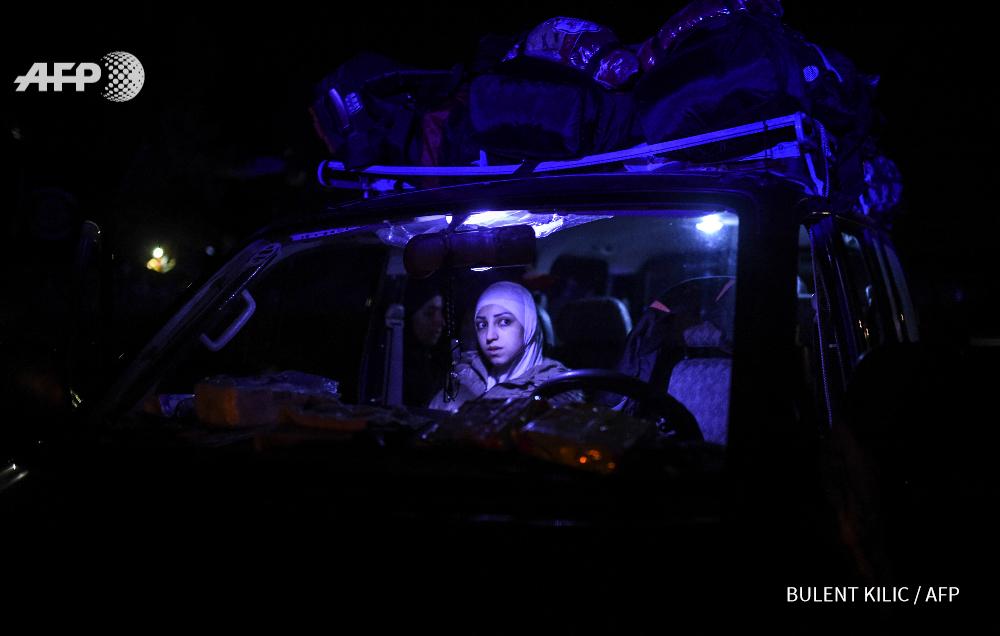
..................................................................Syrian refugee waits inside a car in Edirne on her way to the border between #Turkey and Greece. Photo By @Kilicbil #AFP: image via Stéphane Arnaud @StephaneArnaud, 17 September 2015
...................................................................TURKEY - A Syrian woman holds a banner that reads ''we are migrants, we
will pass'' near Edirne. By @Kilicbil #AFP: image via Frédérique Geffard
@fgeffardAFP. 17 September 2015

Syrian refugee waits inside a car in Edirne on her way to the border between #Turkey and Greece. Photo By @Kilicbil #AFP: image via Stéphane Arnaud @StephaneArnaud, 17 September 2015
TURKEY - A Syrian woman holds a banner that reads ''we are migrants, we will pass'' near Edirne. By @Kilicbil #AFP: image via Frédérique Geffard @fgeffardAFP. 17 September 2015
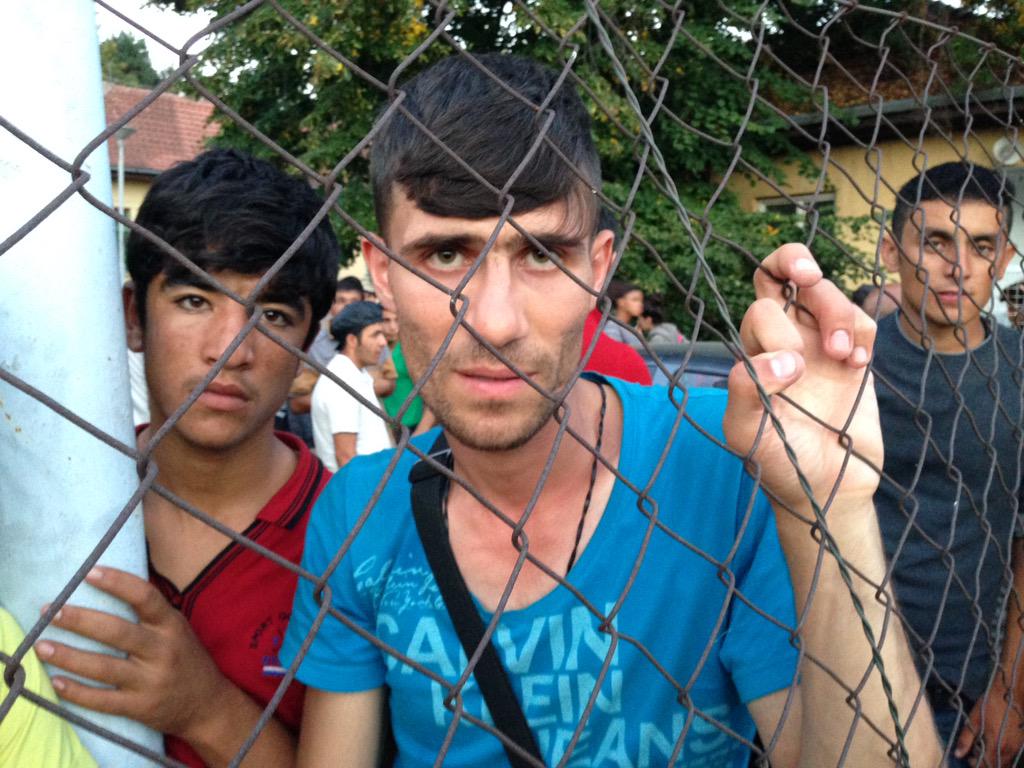


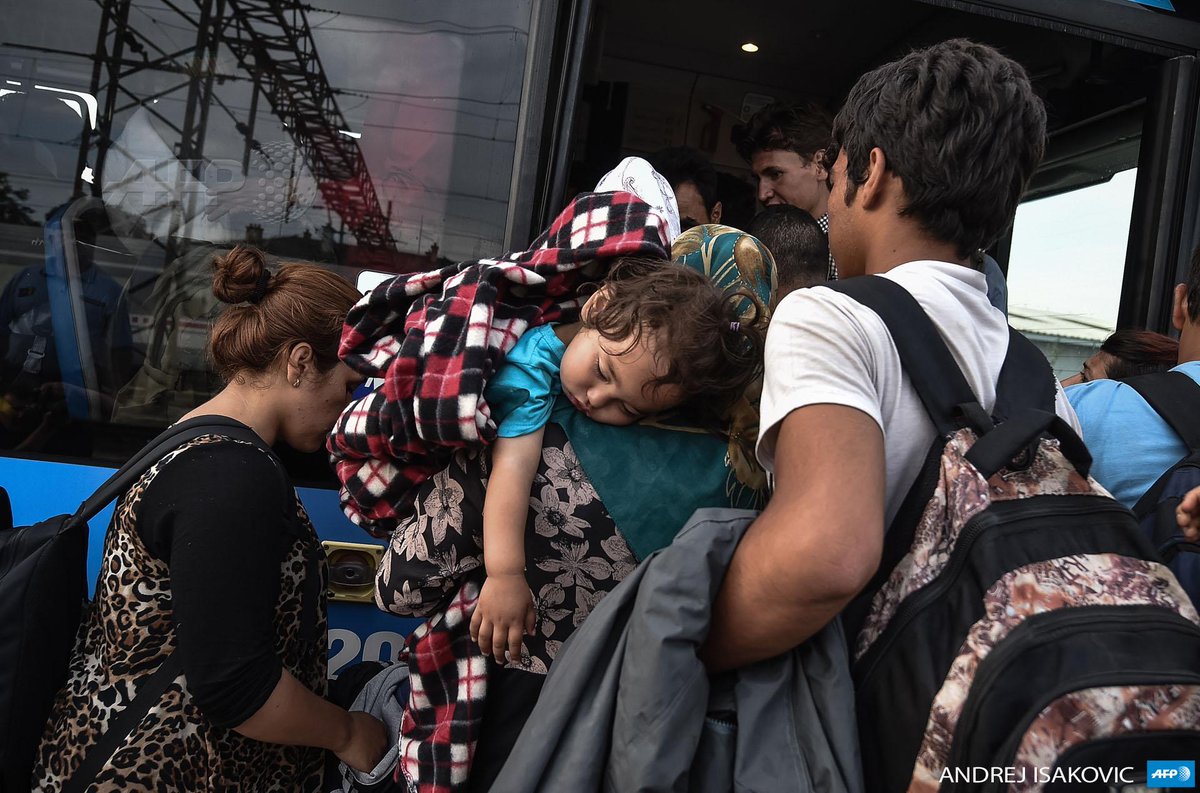
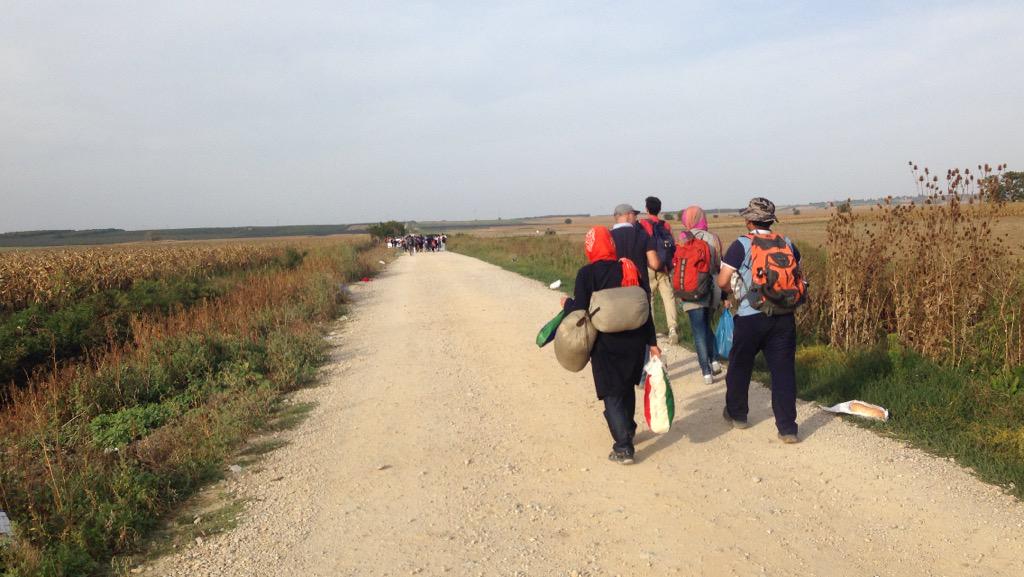
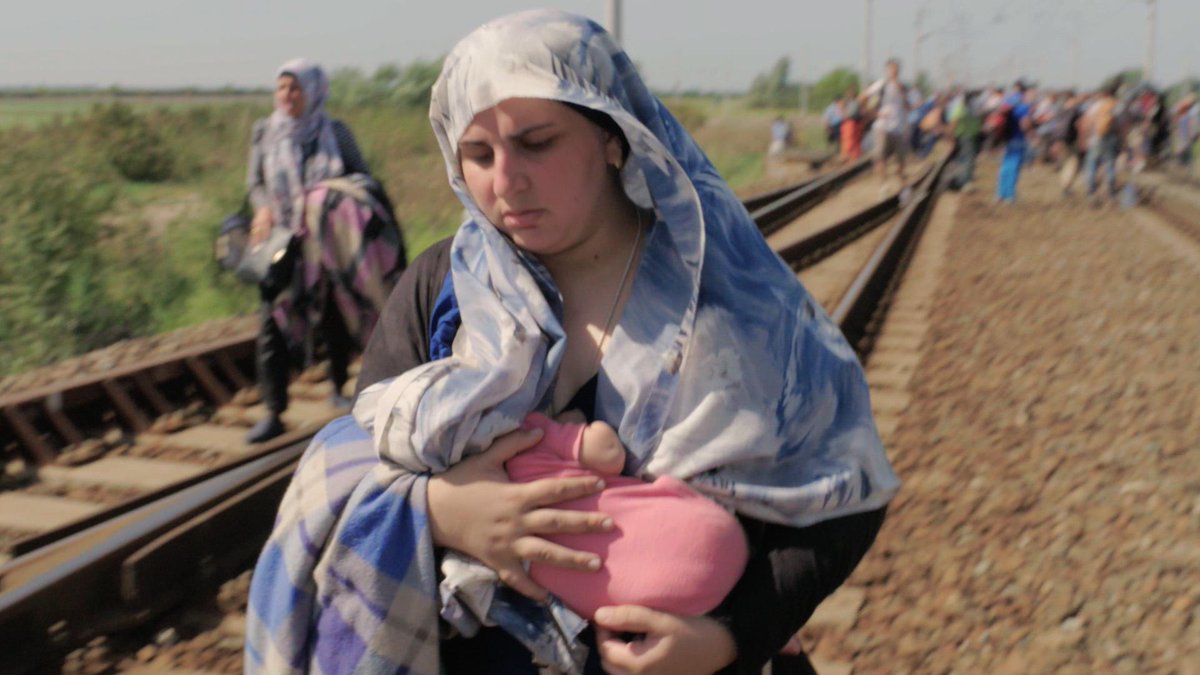
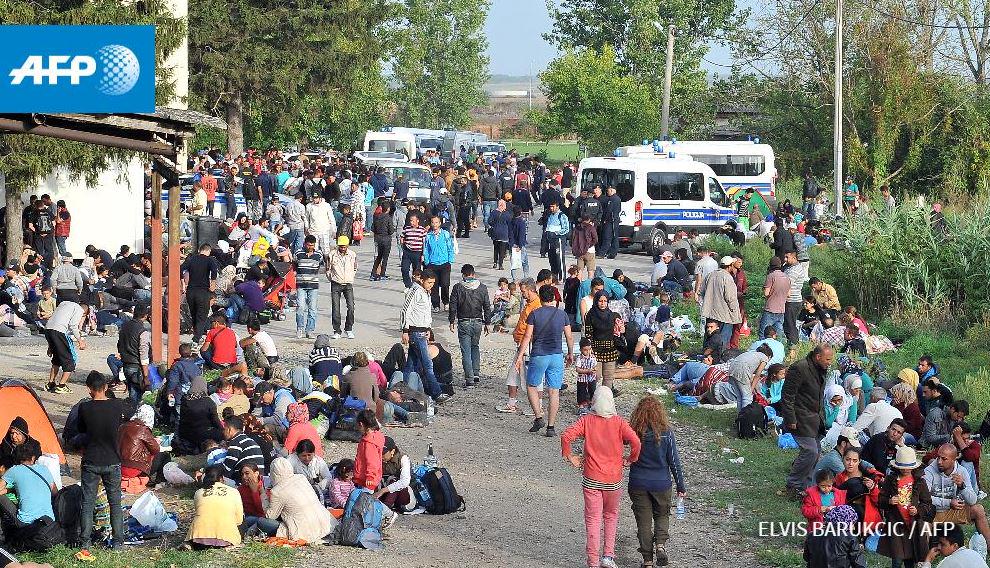
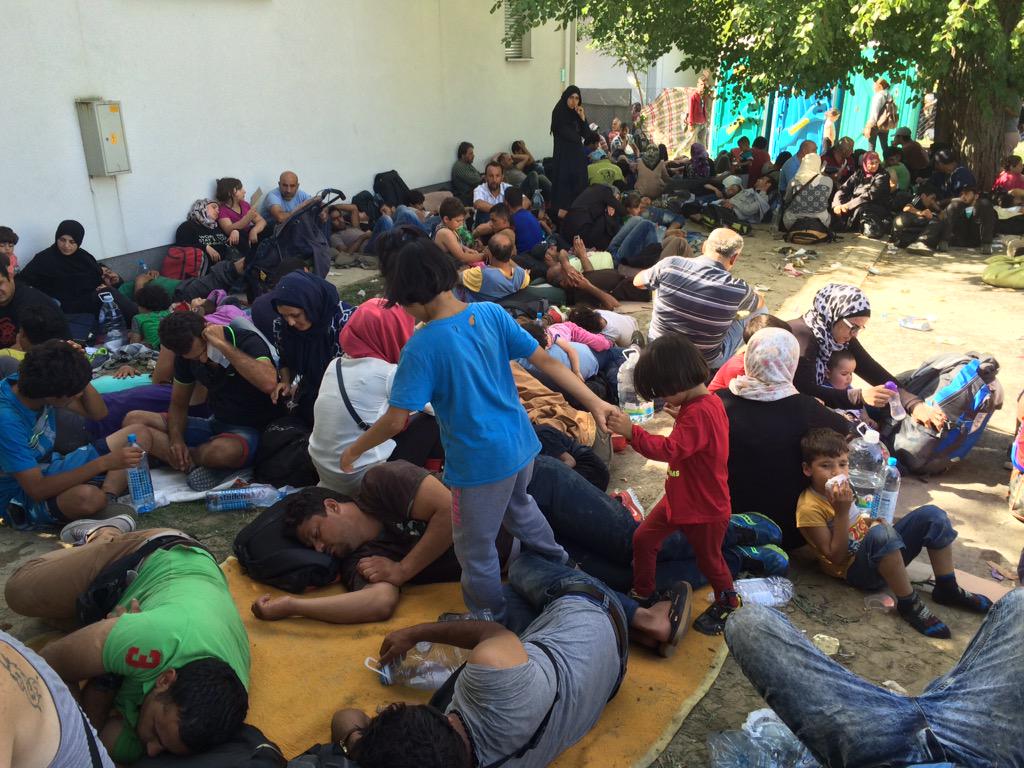

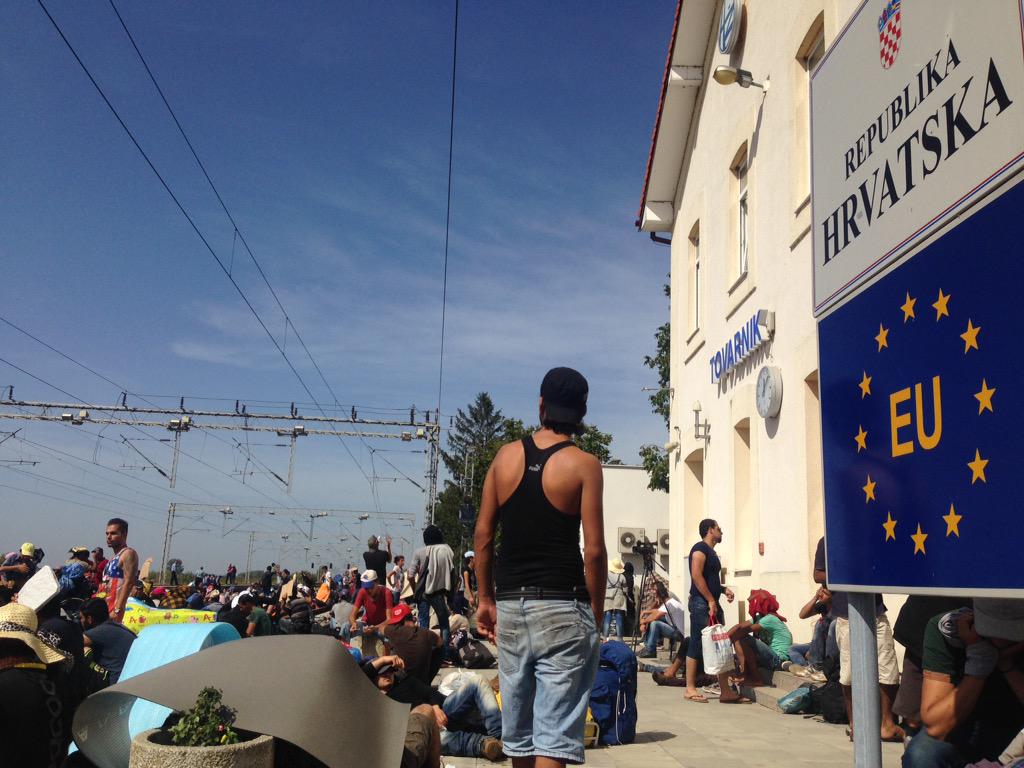
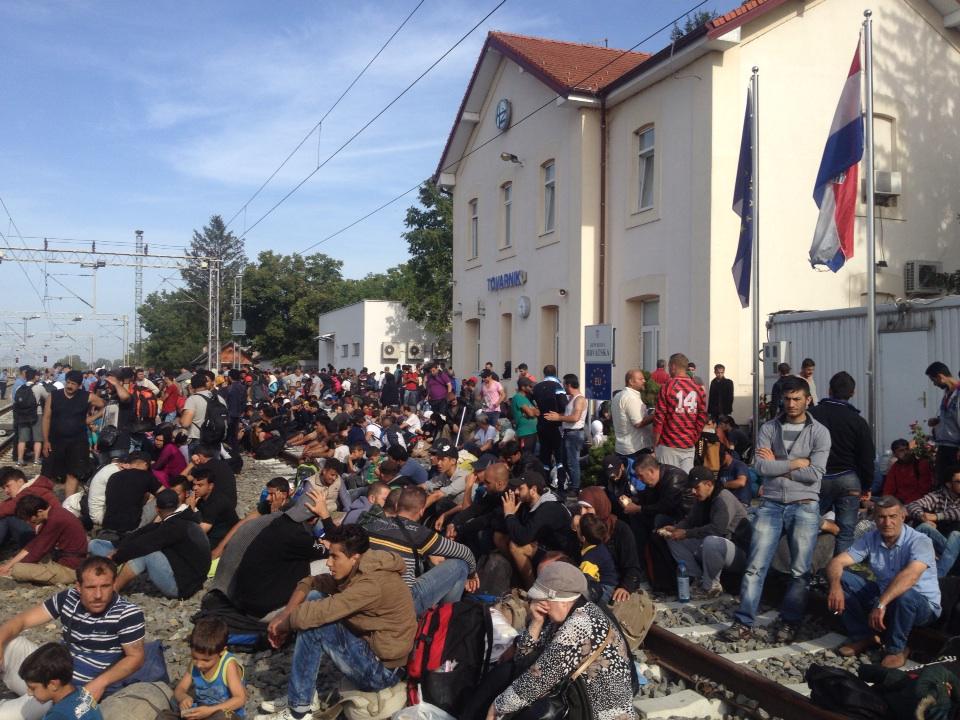
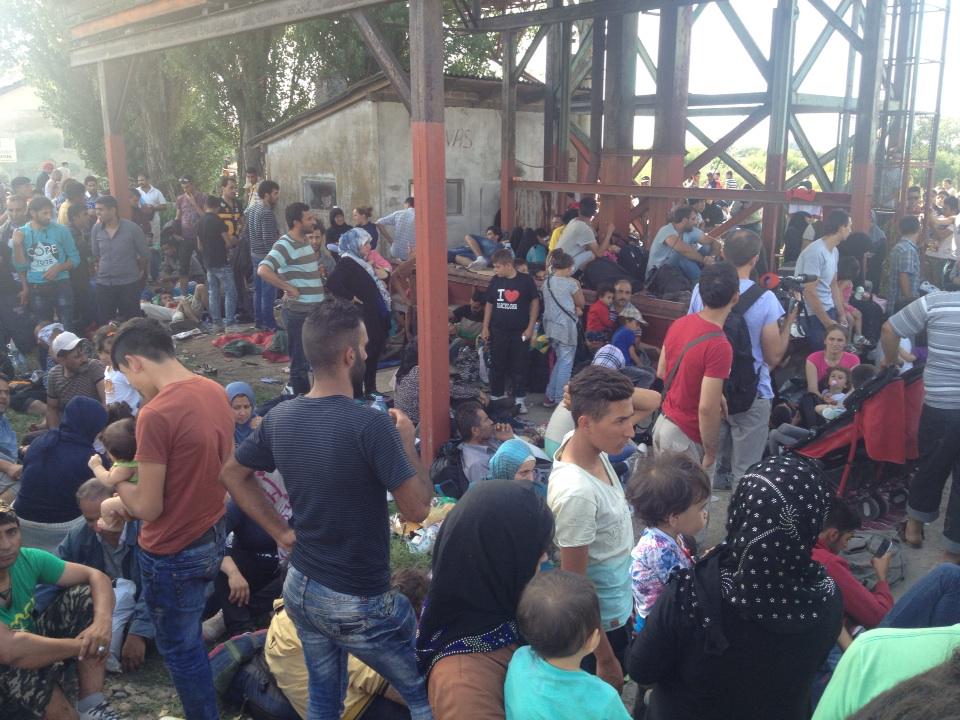
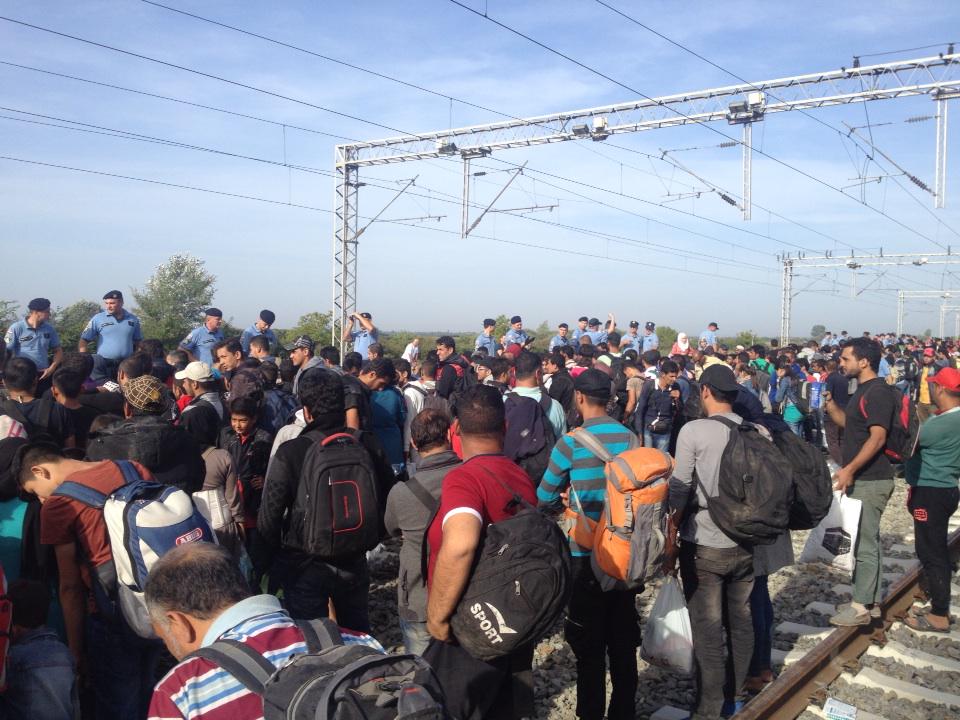
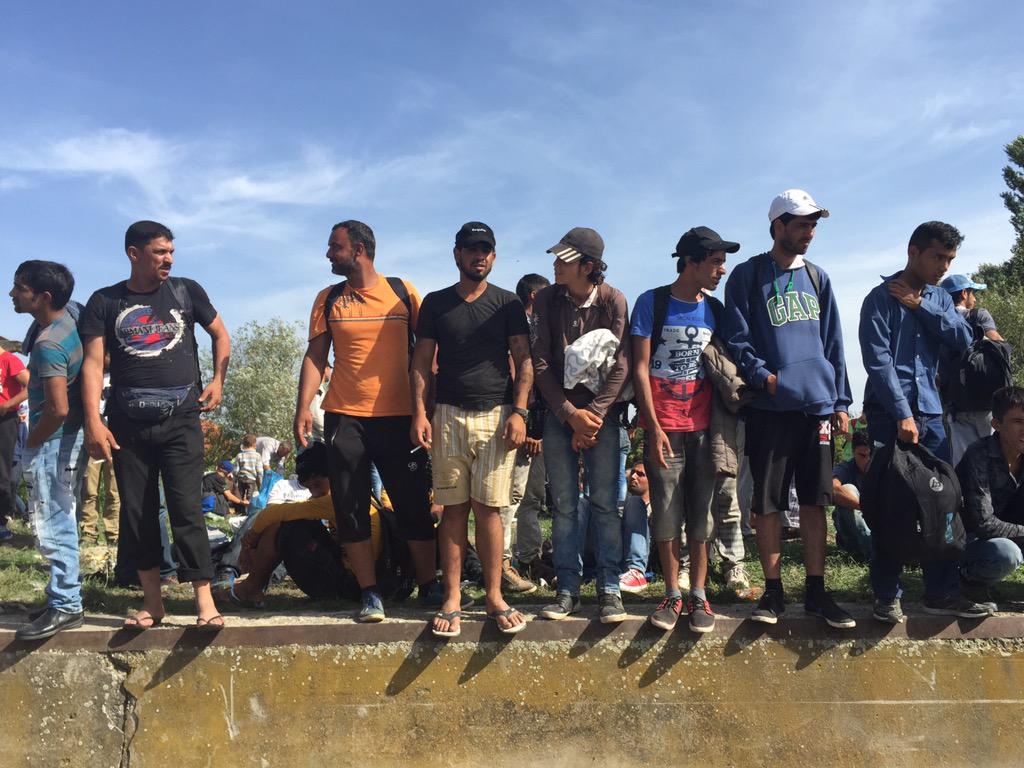
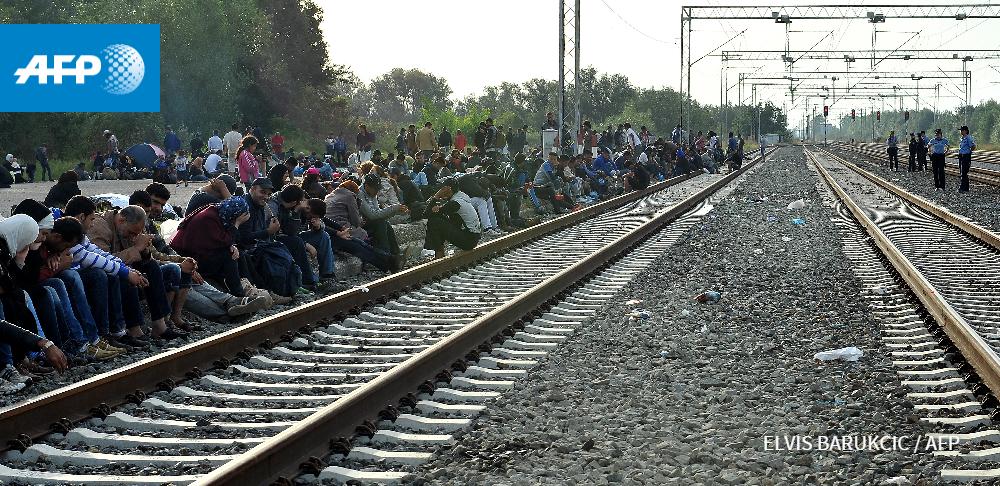

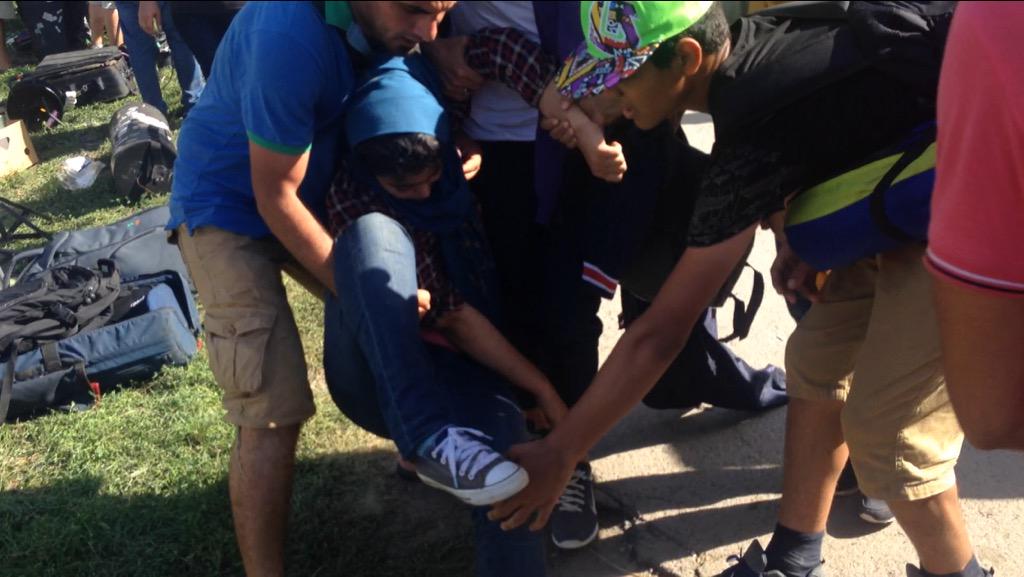
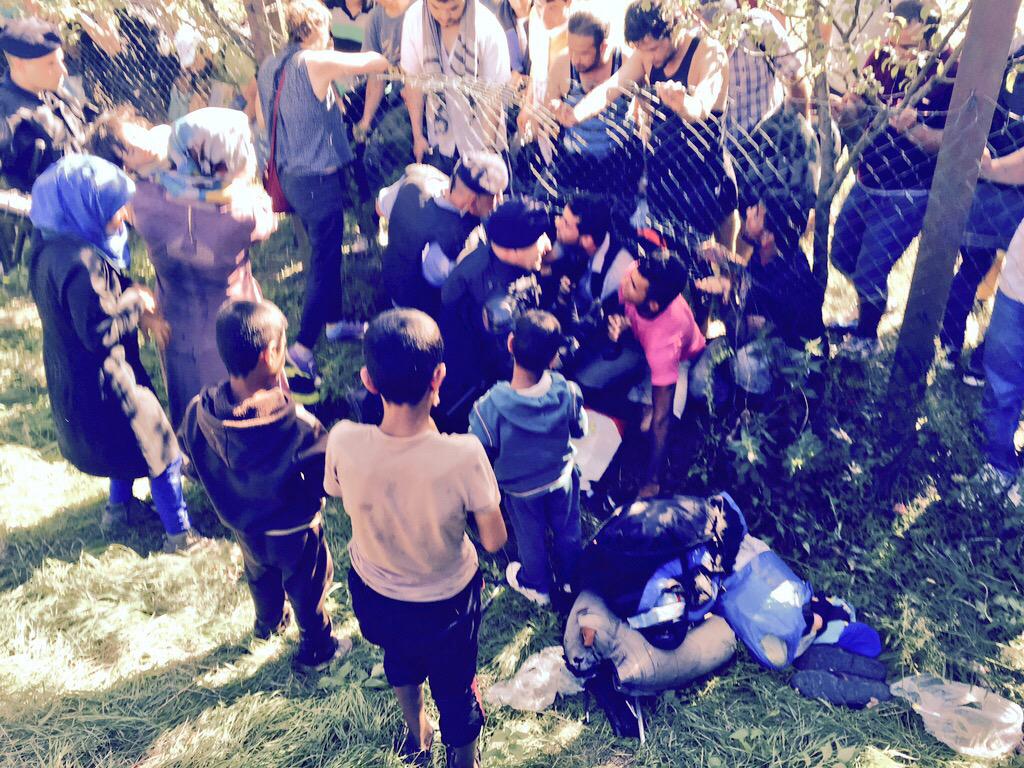
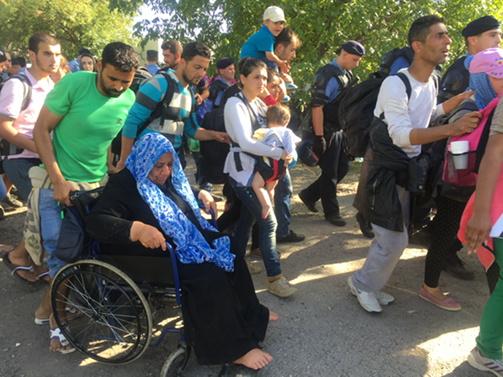
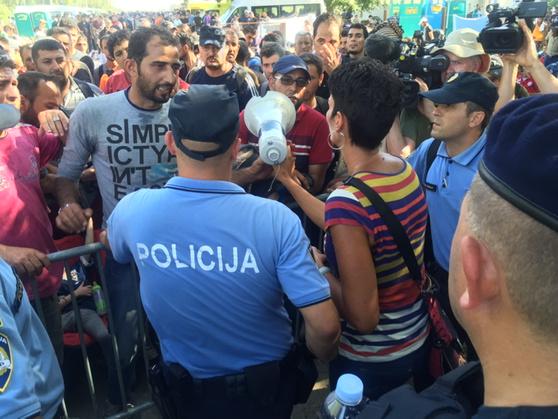





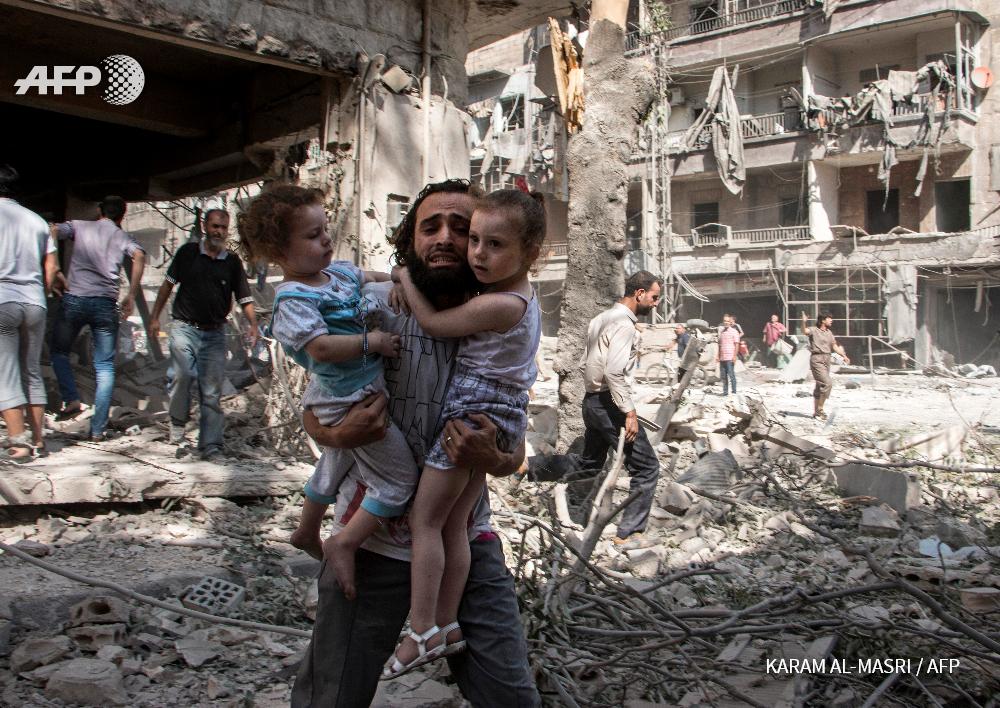

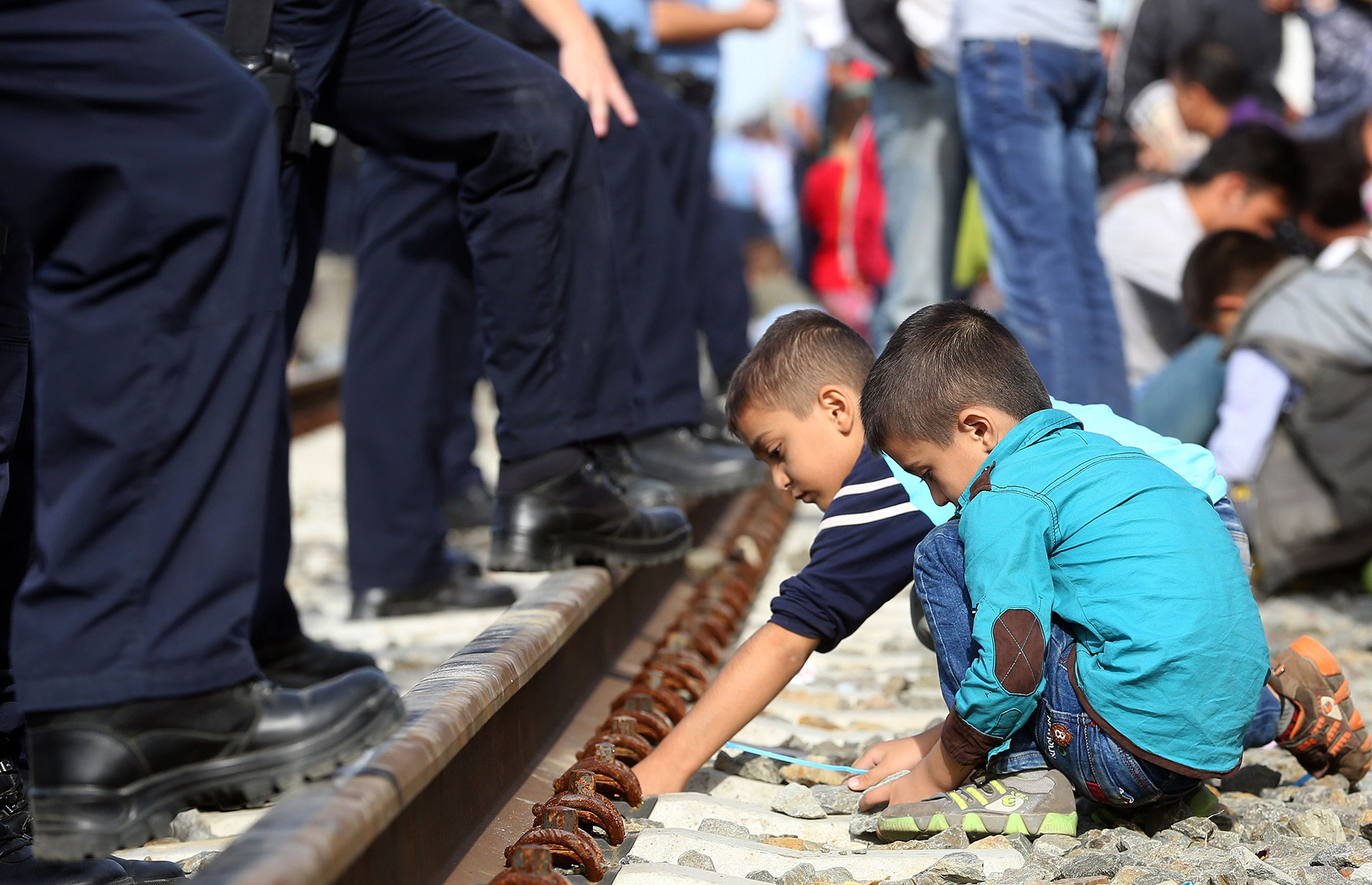
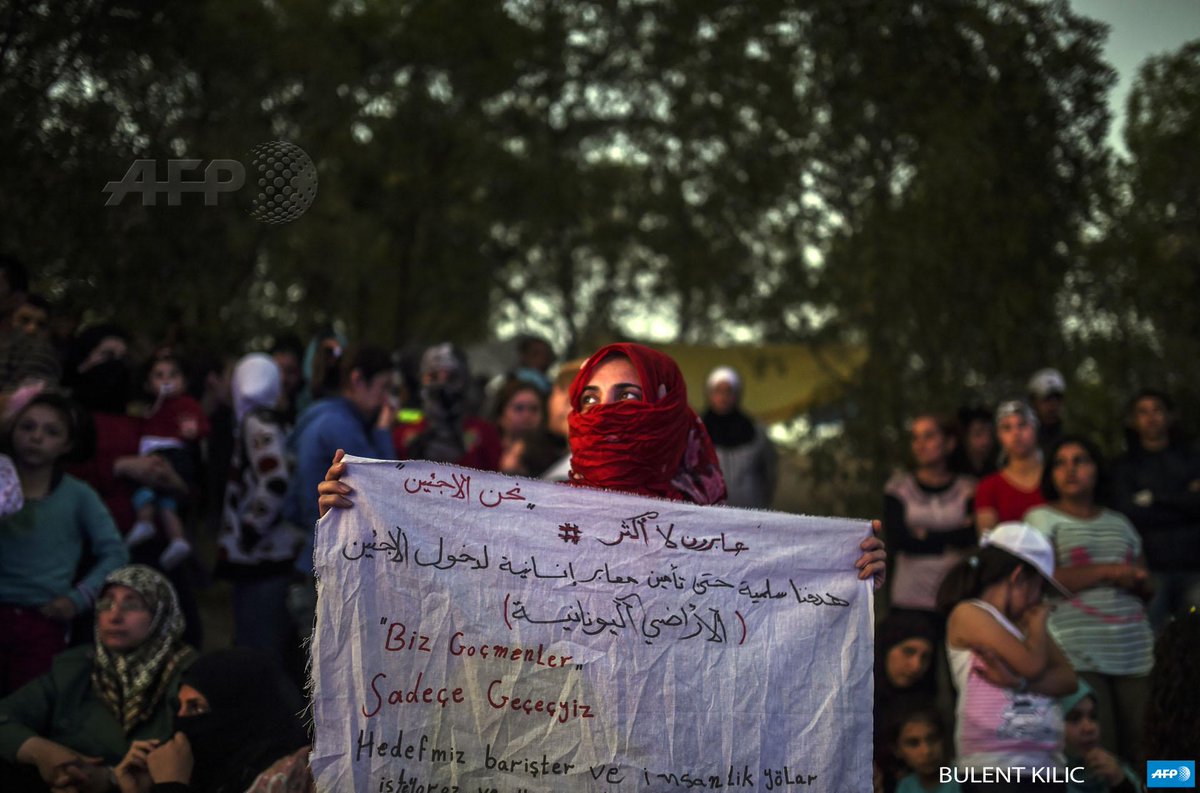
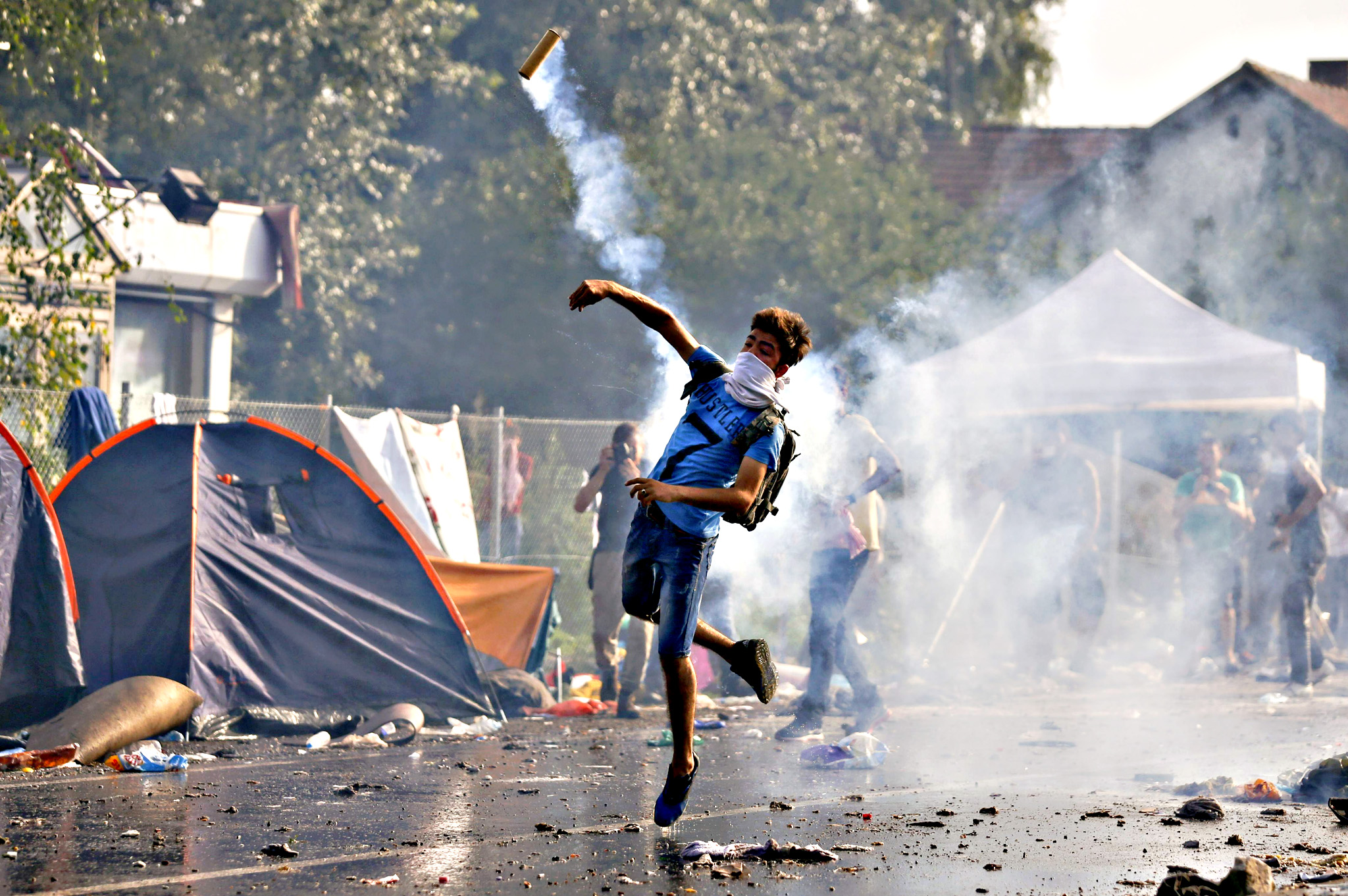
How many times does a heart break?
ReplyDeleteTo watch these events unfold in the 21st century is to question everything it means to be human.
Yes. We are shaken, exhausted by this. It's as though we'd never known anything.
ReplyDeleteVery, very hard to turn away from the unfolding revelation of, as you say, the human ... the human which is capable of sectioning off so much of what it does into its under the stairs blind spots, and so goes on, almost as a train in a dreamt loop that goes round and round without ever arriving at any station.
Two pieces of music haunting the mind in odd conjunction this afternoon...
Dion DiMucci: The Wanderer (1961)
Thomas Tallis: Spem in Alium (1570): The Tallis Scholars
It's a daily assault. Keep witness.
ReplyDeleteSo necessary what you're doing here, Tom. Over here, grumblings this week in the press and on the street that these people have mobile phones. Dare to have mobile bloody phones. That they're dragging the last blasted fragments of what are recognisable as ordinary lives across the continents apparently demonstrates that they are, as was always suspected, just another bunch of welfare scroungers secretly living the life of Riley. Makes you think we Brits reserve our unqualified compassion only for skeletal children with flies on their eyes. If it isn't that, can't really be that bad, can it? So please keep those images coming of what these people are fleeing from, those inconceivable streets of dust and men carrying their children through the rubble.
ReplyDelete"...please keep those images coming of what these people are fleeing from, those inconceivable streets of dust and men carrying their children through the rubble."
ReplyDelete"It's a daily assault. Keep witness."
Hilton and Barry, Thank you as well as Maureen for being among the diminishing few to bear up under the daily assault -- which, nuttily enough, I had hoped/prayed might be accepted not as a blow or a scold but simply as an offering of otherwise unavailable knowledge about the world we live in, the species from which we derive, the civilization of which we in "The West" are meant to be the brilliant culmination.
I take the phrase "daily assault" to refer to the effect of these posts upon the delicate sensibilities of whatever "audience" may trickle in.
But then too of course, and inescapably, there is the REAL daily assault of the moribund, bitter, xenophobic, racist white "Christian" society of Europe upon what is now generally and increasingly if not always openly viewed as an invading army of the Other, which must be stopped at all costs.
__
One of the on-the-ground journalists whose coverage I've been following tweeted this from Röszke, three days ago:
Many of Hungary's official border crossings with Serbia also closed today. When asked why a Hungarian border guard said "Syria, Islam": Matthew Cassel @matthewcassel, 18 September 2015
In the interim, he's seen new walls go up, new masses of exhausted, lost and confused people turned away, the situation continuing to deteriorate. This morning he tweeted this, from Croatia:
This is a crucial moment in history: will privileged nations support people in search of better lives or build more walls to keep them out?: Matthew Cassel @matthewcassel, 18 September 2015
The "news" so called is meanwhile as fluid as might be the parameters of any uncontrollable flood.
ReplyDeleteThis news report from The Guardian this morning:
More than 2,000 refugees stranded at Croatian border town: Train due to take people west from first town after Serbian border is sitting at station, as Croatia closes all but one of its road border crossings: Patrick Kingsley in Tovarnik for The Guardian, 18 September 2015:
More than 2,000 refugees were left stranded overnight in a town near Croatia’s border with Serbia as Slovenia prevented hundreds of others from leaving north-west Croatia, leading to fears that the latest refugee route into the EU may turn out to be a dead-end.
Croatia has closed seven of its eight road border crossings with Serbia after complaining of being overwhelmed by the arrival of more than 11,000 migrants and refugees, though many people have continued to cross through via cornfields.
Refugees began entering Croatia in large numbers on Wednesday, after Hungary closed its borders. Croatia’s prime minister initially said his country was ready to provide a safe passage for people trying to reach Slovenia, and the stability of northern Europe beyond.
But within hours it became clear that Croatia had underestimated the scale of the challenge it had taken on, failing to provide enough transport to speed thousands of newcomers away from Serbia and towards Slovenia. A logjam stretching west to east across northern Croatia was created after Slovenia blocked the onwards transit of refugees, stopping about 150 people from crossing in by train. On Thursday, Slovenia had said it was ready to provide immediate shelter and humanitarian care for 5,000 refugees.
At least 2,000 people were stuck in Tovarnik, the first Croatian town after the border with Serbia. While a specially commissioned train arrived to pick many of them up at about midnight, the train was still waiting in the station at 7am, its 10 carriages packed with about 1,000 restless refugees largely from Syria, Afghanistan and Iraq.
More than 1,000 others were left sleeping on the station platforms and in the streets of Tovarnik, a small and sleepy rural town that has no hotels. Small children slept on cold stone slabs, and a baby was placed inside a small suitcase to keep it warm.
Amid ever-deepening division and a war of words between eastern and western Europe over how to cope with hundreds of thousands of arrivals, Donald Tusk, the president of the European council, on Thursday called an emergency summit for next week to tackle the refugee emergency. Among the factors at issue is the question of compulsory EU refugee quotas, to relieve the pressure on Germany and Sweden, which are bearing the brunt of the influx of newcomers.
As Croatia considered whether to close its border with Serbia entirely, Hungary began building a fence and deploying hundreds of soldiers and police on its border with Croatia. Its prime minister, Viktor Orbán, said construction of the fence would be finished on the 26-mile (41km) stretch of the border not divided by a river by the end of Friday.
Hundreds more refugees arrived at Tovarnik during the night, after being bussed straight from Macedonia to the Croatian border by the Serbian government. Several were not quite sure where they were. “What’s the name of this country?” asked Ali Sadoun, a 40-year-old baker who fled Iraq after receiving a death threat from the militia.
[Patrick Kingsley report continues:]
ReplyDeleteSitting next to the train-tracks at 4am, one of the night-time arrivals, Syrian undergraduate Zahraa Daoud, spoke out at yet another obstacle being placed in her path. “They don’t want us to pass,” said Daoud, who is travelling with her mother. “Why? We are humans. We are Syrians, and there is a war in our country that even we don’t really understand.”
But despite her frustration, Daoud also said she was determined to continue her journey, whatever the challenges Europe places in front of her – a view often expressed by the protagonists of the continent’s biggest wave of mass-migration since the second world war.
“I don’t have anything to lose, so I fear nothing,” said Daoud, a 23-year-old literature student who asked to be described as from the Ismaili faith. “I’ve been thinking about leaving for two years. But for a long time I thought: there is still hope [of peace], I will wait.
“But when you leave home every day and you don’t know whether you’ll see your mum again at night, because you might be killed by a bomb or taken [by a militia], you have to run. So I will not go back. I will run, run, run. Even if they will not allow me to, I will keep on running.”
___
And meanwhile, on the "home" front, this just in:
Donald Trump fails to correct questioner who calls Obama Muslim: Republican presidential contender says ‘we’re going to look at that’ after man at New Hampshire rally asks anti-Muslim question: Ben Jacobs in Rochester, New Hampshire for The Guardian: 18 September 2015:
Donald Trump dodged a question at a campaign event on Thursday night from a man in New Hampshire who stated that Barack Obama is a Muslim and “not even American”.
At Trump’s first campaign event following Wednesday’s Republican debate, he took questions from a crowd of 3,000 at a high school in Rochester, New Hampshire. The first person to ask stated: “We have a problem in this country, it’s called Muslims. We know our current president is one.”
At that point, Trump said “right” uneasily. The questioner then added: “You know he’s not even American, birth certificate man.” At that point, Trump said somewhat resignedly “we need this question” to scattered laughter at the audience.
The questioner eventually wrapped up by noting, “But anyway, we have training camps growing where they want to kill us. That’s my question. When can we get rid of them?”
Trump responded as vaguely as humanly possible. “We are going to be looking at a lot of different things,” he said. “A lot of people are saying that and a lot of people are saying that bad things are happening out there, we’re going to be looking at that and plenty of other things.” The Republican frontrunner then quickly moved on to the next question.
In a statement, the Trump campaign said: “The media wants to make this issue about Obama. The bigger issue is that Obama is waging a war against Christians in this country. Christians need support in this country. Their religious liberties are at stake.”
There's a notable, or just predictable, absence of those images of devastation in the British media, which, along with the persistent blurring of the distinction between 'refugee' and (economic) 'migrant', helps to keep alive the knee-jerk suspicions that these people can't really have it so bad, they're really just after a piece of our irresistible Western lifestyle. We must offer them what we can, but I wish we had something better.
ReplyDeleteAnother perspective, today, from Rania Khalek, in which the lurking shadow of the regional 800-pound gorilla, that vast teenager always embittered and looking for somebody weaker upon whom to take out its chronic resentment, is noticed (in case anyone were ever tempted to forget it was there): Israeli leaders delight in Europe’s cruelty toward refugees: Rania Khalek, The Electronic Intifada, 18 September 2015:
ReplyDeleteAs most of the world looks on in horror at Europe’s atrocious response to refugees escaping war and persecution in the Middle East and Africa, some Israeli officials are quietly reveling in the chaos.
Dore Gold, director general of the Israeli foreign ministry, expressed optimism that the refugee influx will shift Europe to the right, making it more sympathetic to Israel’s “security” justification for its ongoing colonization of Palestine.
“Israel always faced the problem in the past that its national security perspective was completely out of sync with how Europeans were viewing the emergence of the European community and the borderless world that was emerging,” the American-born hardliner told The Jerusalem Post.
“In the European models that existed 25 or 30 years ago, it is kind of difficult to hear an Israeli argument. But now things may be beginning to change a little,” posited Gold.
“The European perspective is beginning to sound a little bit more like Israel’s perspective on security issues, compared to what it was in the past.”
Echoes of the Holocaust
Images of refugees being corralled in trains, tracked with numbers on their forearms, locked away and fed like zoo animals in overcrowded camps and blocked with razor wire fences from entering Hungary have recalled memories of Europe’s darkest chapter.
All the while, refugees continue to die en masse on perilous journeys to Europe, sometimes drowning on rickety boats by sea and other times suffocating in trucks on the side of highways.
Frequently overlooked is the fact that these deaths are a direct consequence of European border policies designed to make migration as unsafe as possible.
The only thing less acknowledged is the root catalyst.
Rapacious policies advanced by wealthy nations in the increasingly gated Global North have destabilized and fueled the very unrest that has produced the worst refugee crisis since the Second World War.
It’s no coincidence that many of the refugees at Europe’s doorstep are fleeing unrest in Syria, Libya, Iraq and Afghanistan — all countries the US and its allies have directly and indirectly pillaged and destabilized.
Keeping Europe Christian
While there is plenty of blame to go around for the current crisis, Hungary’s actions — coupled with the jingoistic rhetoric of its right-wing Prime Minister Viktor Orban — have provoked the most widespread revulsion.
Muslim refugees must be kept out of Europe “to keep Europe Christian,” said Orban in an opinion piece urging Germans not to welcome Muslim refugees.
“We shouldn’t forget that the people who are coming here grew up in a different religion and represent a completely different culture,” he insisted. “Most are not Christian, but Muslim. … That is an important question, because Europe and European culture have Christian roots.”
A statement from Zeid Ra’ad Al Hussein, the UN’s high commissioner for human rights, attributed Hungary’s “callous” and “illegal” treatment of refugees to “the xenophobic and anti-Muslim views that appear to lie at the heart of current Hungarian government policy.”
As it turns out, Orban’s ruling party, Fidesz, is smitten with Israel, particularly Prime Minister Benjamin Netanyahu’s Likud party. During a visit to Israel in 2005, Orban reportedly declared, “Likud is our natural ideological partner.”
He has since adopted several Israeli practices.
Inspired by Birthright, a program that sends young American Jews on free trips to Israel in hopes they will immigrate, Orban launched a Hungarian Birthright program for North Americans of Hungarian descent.
Barry, sorry I'd missed yours -- right on point, once again -- concerning that "...notable, or just predictable, absence of those images of devastation in the British media, which, along with the persistent blurring of the distinction between 'refugee' and (economic) 'migrant', helps to keep alive the knee-jerk suspicions that these people can't really have it so bad, they're really just after a piece of our irresistible Western lifestyle. We must offer them what we can, but I wish we had something better."
ReplyDeleteI do agree, and the terrible pathos that lies in the fact that the best we can offer is to vend to any wanderer with the means to buy, the cruel, heartless robotic "lifestyle" that is indeed, to use the Trollope phrase, The Way We Live Now, may be the worst part of this whole terrible business.